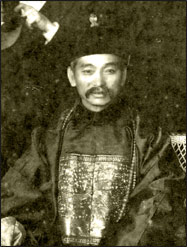Mei Quong Tart
| Mei Quong Tart | |||||||||||
 |
|||||||||||
| Traditional Chinese | 梅光達 | ||||||||||
|---|---|---|---|---|---|---|---|---|---|---|---|
| Simplified Chinese | 梅光达 | ||||||||||
|
|||||||||||
| Transcriptions | |
|---|---|
| Standard Mandarin | |
| Hanyu Pinyin | Méi Guāngdá |
| Yue: Cantonese | |
| Yale Romanization | Muìh Gwōngdaaht |
Mei Quong Tart (1850–1903) was a leading nineteenth century Sydney merchant from China. He was one of Sydney's most famous and well-loved personalities and made a significant impact on the social and political scene of Sydney at a time of strong anti-Chinese sentiment in Australia. In Australia, he is usually referred to by his given name, "Quong Tart," or by a shortened nickname, "Quong."
A prominent businessman, he owned a network of tearooms in the Sydney Arcade, the Royal Arcade and King Street. His crowning success was the ‘Elite Hall’ in the Queen Victoria Market, now the Queen Victoria Building. He was also a community leader, well connected with the local political and social elites.
In the absence of an official Chinese consul, he was acting consular to the imperial Chinese government at the time. In 1903, Edmund Barton, the Prime Minister of Australia, together with the premier and chief justice of New South Wales, the mayor of Sydney, and consuls of 20 major powers to Sydney certified that they recognised Quong Tart as the acting consul for China. The Imperial government of China awarded him the status of a Mandarin of the fifth degree, with blue feather, in 1887, in acknowledgment of his service to the Overseas Chinese community and to European-Chinese relations in Australia and for assisting with the 1887 Chinese mission to Australia sponsored by Zhang Zhidong, which was the first official Chinese mission to visit Australia. In 1894, he was advanced to the fourth degree by the Emperor personally and was appointed Mandarin of the Blue Button, honoured by the Dragon Throne with the Peacock Feather. Quong Tart's parents and grandparents were also granted titles at the same time.
An active philanthropist, he often provided dinners, gifts and entertainment at his own expense for recipients ranging from the Benevolent Society home at Liverpool, to the newsboys of Ashfield, Summer Hill, Croydon and Burwood. From 1885 to 1888, he provided a series of dinners for the inmates of destitute asylums. He also had progressive ideas about Sydney social politics. His tea rooms were the site of the first meetings of Sydney's suffragettes, and he devised new and improved employment policies for staff, such as paid sick leave.
...
Wikipedia
